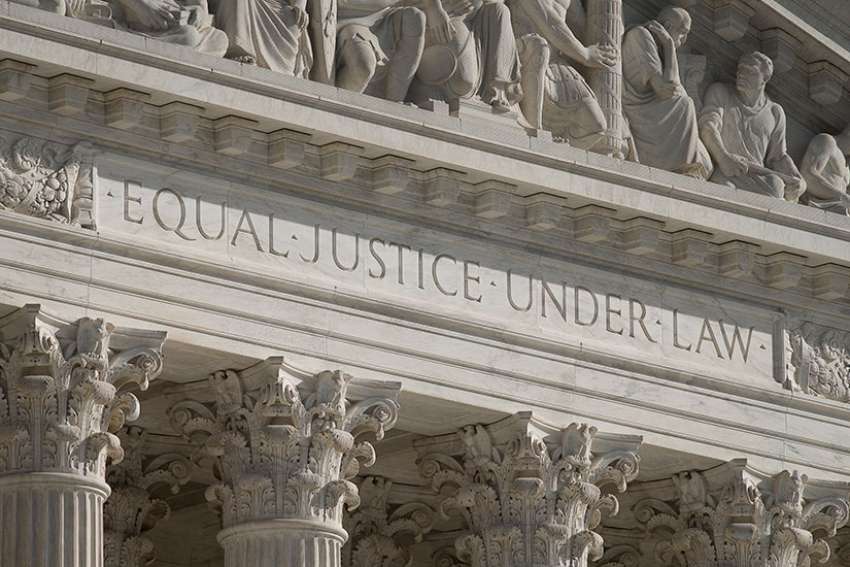"Today's decision will have human consequences," said Bishop Joe S. Vasquez, of Austin, Texas, following the U.S. Supreme Court's announcement that in October it will hear a case involving President Donald Trump's travel ban, which seeks to delay entry into the country by immigrants, including refugees, from six majority-Muslim countries. It also seeks to suspend, for a time, the entry of all refugees.
The court announced June 26 that until its hears the case in the fall and weighs a decision, it would allow part of the ban to be implemented and some "foreign nationals" will be barred from entering the country, but that determination will be made depending on the applicant's previous relationships with a person or institution in the U.S. The administration says it needs to implement the ban while it reviews the refugee resettlement program and its vetting procedures.
Bishop Vasquez said the bishops are "deeply concerned about the welfare of the many other vulnerable populations who will now not be allowed to arrive and seek protection during the proscribed pause, most notably certain individuals fleeing religious persecution and unaccompanied refugee children."
He urged the Trump administration to include refugee service providers as well as national security and immigration experts in a timely, transparent and efficient review of the existing refugee resettlement program.
"We believe it is vital to utilize the full expertise of the existing resettlement program when conducting such an important evaluation," he said in a statement issued late June 26.
The court said the partial ban it has allowed to go forward allows "foreign nationals who have a credible claim of a bona fide relationship with a person or entity in the United States" to apply for entry, but "all other foreign nationals are subject to the provisions of (the executive order)."
That means a person with family or a nexus with an organization, such as a university or employer, is not affected by the ban.
The court seemed to be taking into consideration the hardships the ban would create for an "American party," such as a family member, whose relatives are denied entry, or for a university or employer, while also trying to consider the administration's arguments that it's necessary to do so in the interest of national security.
Denying entry to immigrants with no connection to the country "does not burden any American party," the court said. And though the order is seeking to cap the number of refugees allowed into the country at 50,000, the court said that if a person with one of the previously mentioned connections to the U.S. is seeking refuge, "such as a person may not be excluded … even if the 50,000 has been reached or exceeded."
Groups such as Catholic Relief Services, the official international humanitarian agency of the Catholic community in the United States, expressed disappointment with the ruling.
"This ruling will devastate some of the most vulnerable people in the world, innocent people who are fleeing the exact kind of violence that this executive order seeks to protect against," said Bill O'Keefe, CRS' vice president for government relations and advocacy. "The facts tell us that that these refugees already undergo significant vetting - more than anyone who enters the United States – and none has gone on to commit acts of violence."
It also reinforces the false idea that refugees are dangerous, O'Keefe said.
"We outright reject the idea that refugees are implicitly dangerous," he said. "At a time of such unprecedented need around the world, we should be doing more to help and resettle those who are in danger and need, not less."
Christopher G. Kerr, executive director of Ignatian Solidarity Network, a national social justice education and advocacy organization based in Ohio, said the high court's decision "does not reflect our country's spirit of compassion and welcome."
"When we create uncertainty for those seeking safety from conflict and persecution, we compromise their dignity as fellow people of God," said Kerr. "We continue to stand with those seeking refuge and safety here in the United States."
The troubled executive order went into litigation almost as soon as it was issued Jan. 27, just a week into the new president's term. It was revised in March, but those revisions, too, have faced legal challenges.
In a statement after the court's announcement, Trump said the high court's decision was a "clear victory" for national security.
"It allows the travel suspension for the six terror-prone countries and the refugee suspension to become largely effective," he said.
In a partial dissent, Justice Clarence Thomas said he worried that "the court's remedy will prove unworkable" and that the "compromise will burden executive officials with the task of deciding – on peril of contempt – whether individuals from the six affected nations who wish to enter the United States have a sufficient connection to a person or entity in this country."
It also may "invite a flood of litigation until this case is finally resolved," he said.
The U.S. Supreme Court's decision came a day before it ended its current term. The new court term begins in October.


